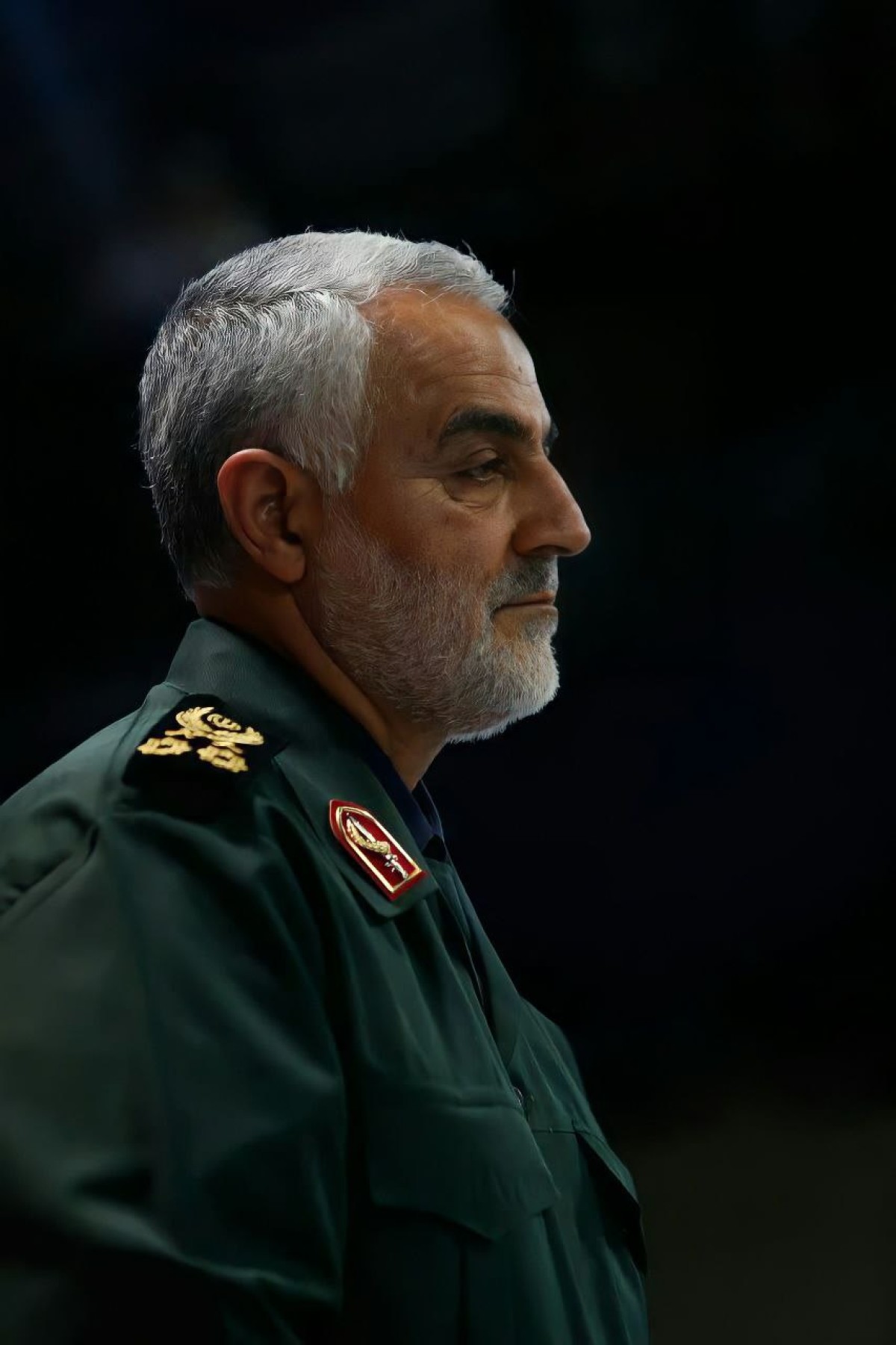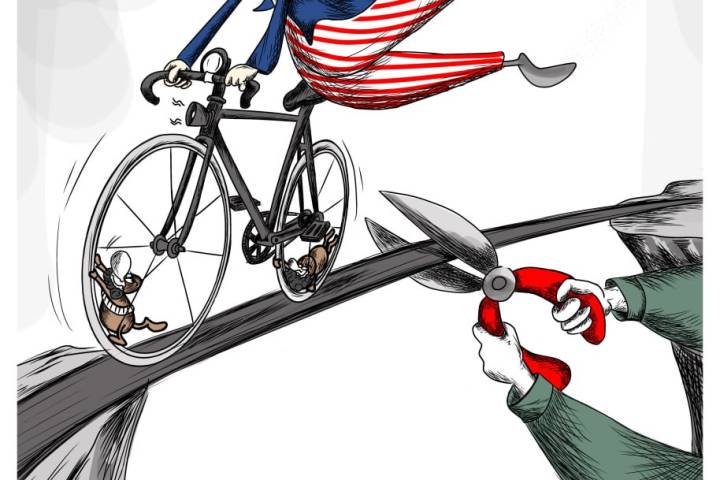American drones hit Martyr Soleimani and Abu Mahdi Al-Mohandis’ convoy at Baghdad Airport almost two years ago.A lot of regional and global events have transpired in the recent two years.As a consequence of this horrible deed, the Axis of Resistance’s achievements have continued, and the resistance forces’ will to combat global arrogance and Zionism has grown.The void created by the departure of a national hero like General Qassem Soleimani, on the other hand, cannot be overlooked. General Soleimani’s efforts across the Middle East region in general, and in Syria, Yemen, and Palestine in particular, was a direct reflection of one of the Islamic Revolution’s core objectives: freedom and regional peace; which Martyr Soleimani, as the Islamic Republic’s son, has strived diligently to promote. Soleimani was a soldier who fought on many fronts, but he had one major goal: to defend the Islamic Ummah and the Palestinian cause. He was in charge of the Islamic Revolutionary Guard Corps’ Quds Force, which has been tasked with liberating Palestine. Martyr Soleimani surmounted every obstacle in the path of Palestine’s freedom and did all in his power to combat Zionists. The martyrdom of Haj Qassem, a major balancing factor and source of peace and stability in the Middle East, generated a plethora of challenges for both supporters and opponents. General Soleimani’s death raised the cost of being a regional ally for the United States. Many pro-Western Middle Eastern regimes are fully aware that any conflict between Iran and the United States would have security repercussions for them, as evidenced by Gen. Soleimani’s martyrdom. Following the assassination of Haj Qassem, Washington’s Arab partners in the area realised that depending on US policies would jeopardise not just their security but also their long-term interests. Trump was concerned about the resistance’s strength and the Zionist regime’s diminishing strength and thought that assassinating Martyr Soleimani would deliver a severe blow to the Axis of Resistance, ensuring Israel’s security. However, the assassination of Martyr Soleimani fueled resistance ardour to confront the Zionist regime all the while crippling Tel Aviv to the maximum extent possible. The Palestinian achievements, particularly in their most recent conflict, known as the Battle of Saif al-Quds, demonstrated to the international community that the phoney Zionist regime could not stand up to the Palestinian nation’s resistance. The Americans believed that by assassinating Gen. Soleimani in Iraq, they would be able to prolong their occupation of the country. On the other hand, the Axis of Resistance continued to fight the invaders since Iraq’s position is crucial to the entire Islamic world. The assassination of Gen. Soleimani, on the other hand, increased the possibility of popular uprisings against the US military in Iraq, forcing the Americans to reduce its troops and withdraw in shame and disgrace from Iraq, despite Washington’s continued provocation of the Kurds and a number of its remaining proxies.The United States is seeking to create instability in Iraq to obstruct the Axis of Resistance, but due to the Iraqi people’s vigilance and unity, the Americans will fail and will not achieve their nefarious goals. Furthermore, the murder of Martyr Soleimani precipitated the fall of Washington’s hegemony and international prestige, and the US has soon found itself in a diplomatic tug-of-war. The official position of pro-US regimes may have been to formally endorse the US action, but practically all of them are fully aware that the assassination of such a significant individual like Gen. Soleimani was tantamount to a real catastrophe. Finally, Haj Qassem’s assassination posed a direct threat to US presence in the Middle East, enhanced Iranian naval forces’ mobility against US warships in the Persian Gulf and beyond, and laid the groundwork for future Iranian tactical responses.
American drones hit Martyr Soleimani and Abu Mahdi Al-Mohandis’ convoy at Baghdad Airport almost two years ago.A lot of regional and global events have transpired in the recent two years.As a consequence of this horrible deed, the Axis of Resistance’s achievements have continued, and the resistance forces’ will to combat global arrogance and Zionism has grown.The void created by the departure of a national hero like General Qassem Soleimani, on the other hand, cannot be overlooked. General Soleimani’s efforts across the Middle East region in general, and in Syria, Yemen, and Palestine in particular, was a direct reflection of one of the Islamic Revolution’s core objectives: freedom and regional peace; which Martyr Soleimani, as the Islamic Republic’s son, has strived diligently to promote. Soleimani was a soldier who fought on many fronts, but he had one major goal: to defend the Islamic Ummah and the Palestinian cause. He was in charge of the Islamic Revolutionary Guard Corps’ Quds Force, which has been tasked with liberating Palestine. Martyr Soleimani surmounted every obstacle in the path of Palestine’s freedom and did all in his power to combat Zionists. The martyrdom of Haj Qassem, a major balancing factor and source of peace and stability in the Middle East, generated a plethora of challenges for both supporters and opponents. General Soleimani’s death raised the cost of being a regional ally for the United States. Many pro-Western Middle Eastern regimes are fully aware that any conflict between Iran and the United States would have security repercussions for them, as evidenced by Gen. Soleimani’s martyrdom. Following the assassination of Haj Qassem, Washington’s Arab partners in the area realised that depending on US policies would jeopardise not just their security but also their long-term interests. Trump was concerned about the resistance’s strength and the Zionist regime’s diminishing strength and thought that assassinating Martyr Soleimani would deliver a severe blow to the Axis of Resistance, ensuring Israel’s security. However, the assassination of Martyr Soleimani fueled resistance ardour to confront the Zionist regime all the while crippling Tel Aviv to the maximum extent possible. The Palestinian achievements, particularly in their most recent conflict, known as the Battle of Saif al-Quds, demonstrated to the international community that the phoney Zionist regime could not stand up to the Palestinian nation’s resistance. The Americans believed that by assassinating Gen. Soleimani in Iraq, they would be able to prolong their occupation of the country. On the other hand, the Axis of Resistance continued to fight the invaders since Iraq’s position is crucial to the entire Islamic world. The assassination of Gen. Soleimani, on the other hand, increased the possibility of popular uprisings against the US military in Iraq, forcing the Americans to reduce its troops and withdraw in shame and disgrace from Iraq, despite Washington’s continued provocation of the Kurds and a number of its remaining proxies.The United States is seeking to create instability in Iraq to obstruct the Axis of Resistance, but due to the Iraqi people’s vigilance and unity, the Americans will fail and will not achieve their nefarious goals. Furthermore, the murder of Martyr Soleimani precipitated the fall of Washington’s hegemony and international prestige, and the US has soon found itself in a diplomatic tug-of-war. The official position of pro-US regimes may have been to formally endorse the US action, but practically all of them are fully aware that the assassination of such a significant individual like Gen. Soleimani was tantamount to a real catastrophe. Finally, Haj Qassem’s assassination posed a direct threat to US presence in the Middle East, enhanced Iranian naval forces’ mobility against US warships in the Persian Gulf and beyond, and laid the groundwork for future Iranian tactical responses.
5






Comment
Post a comment for this article